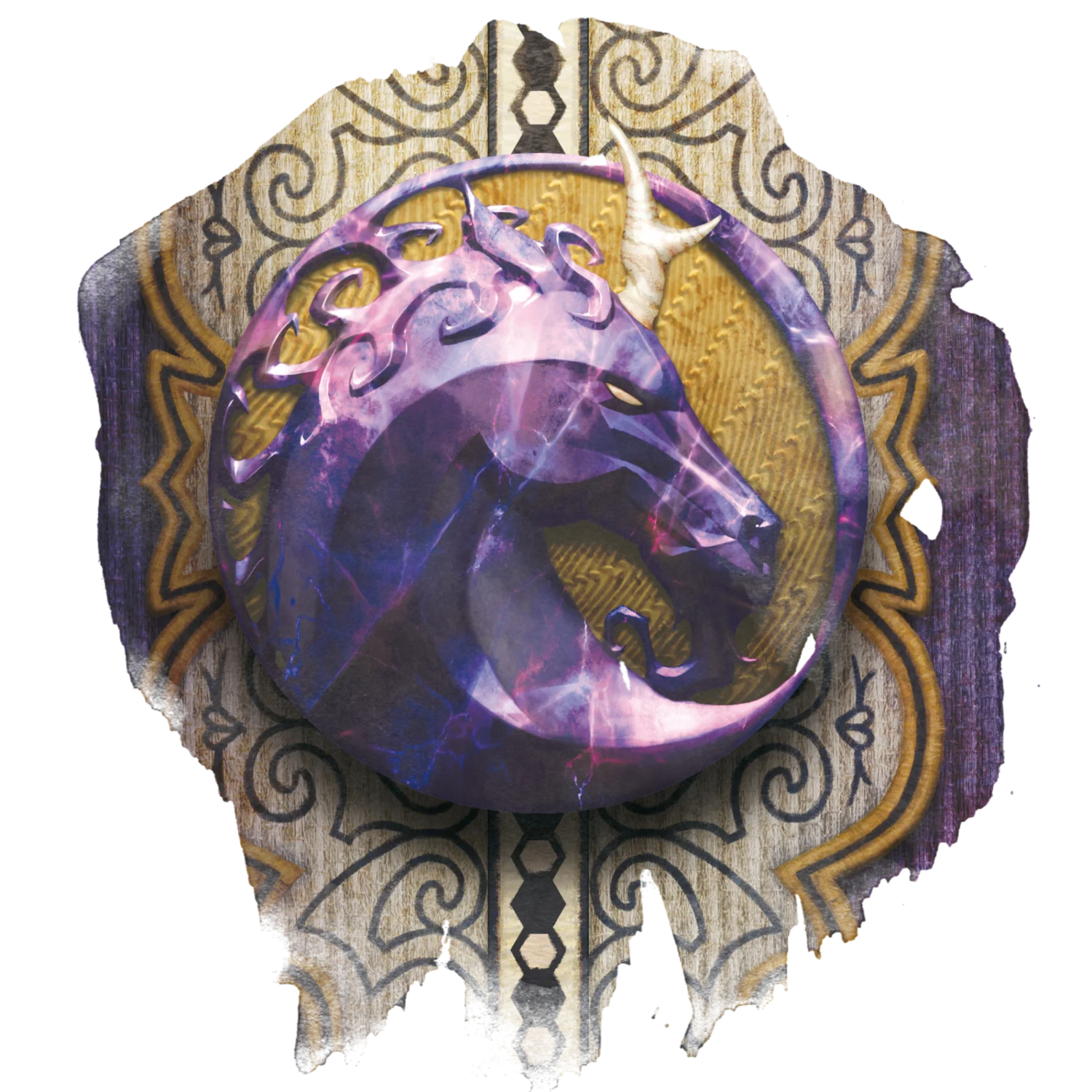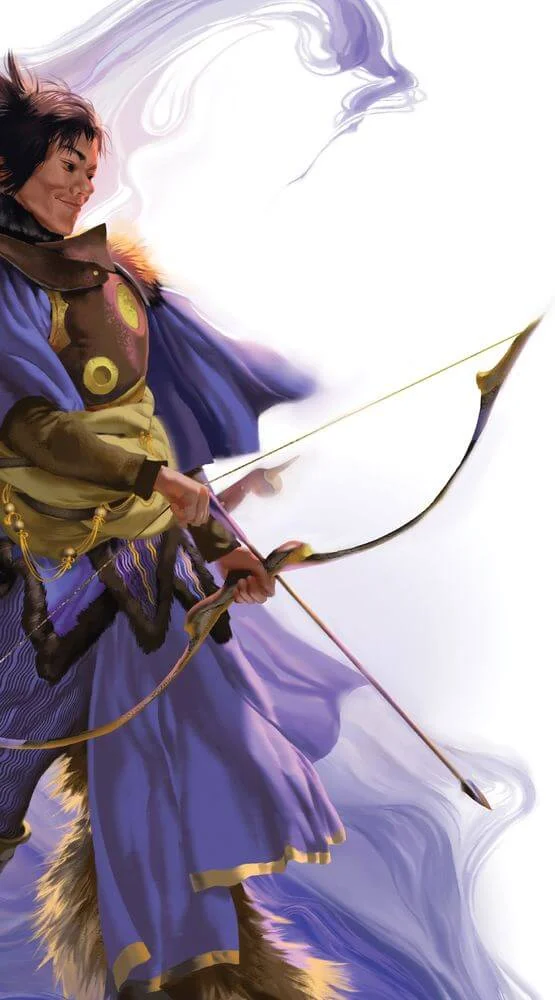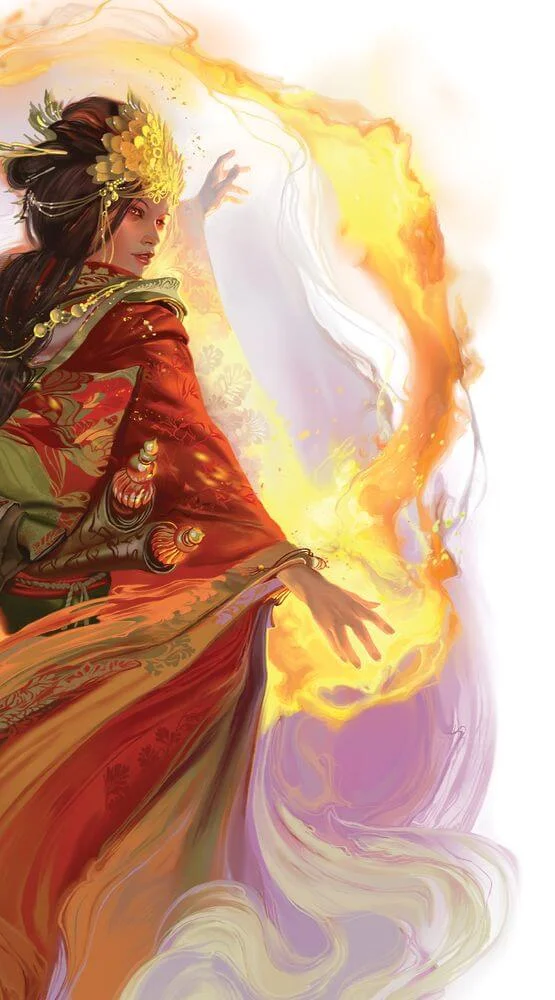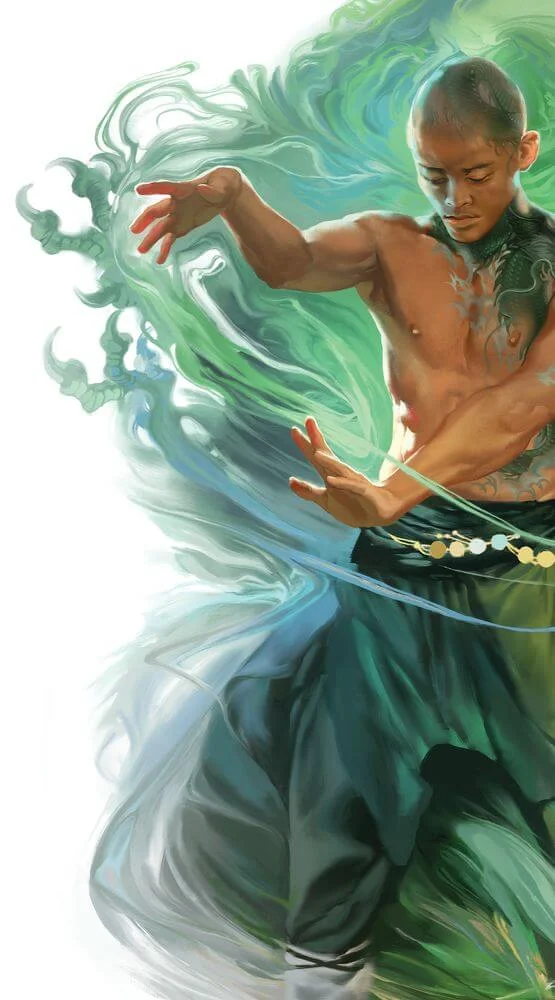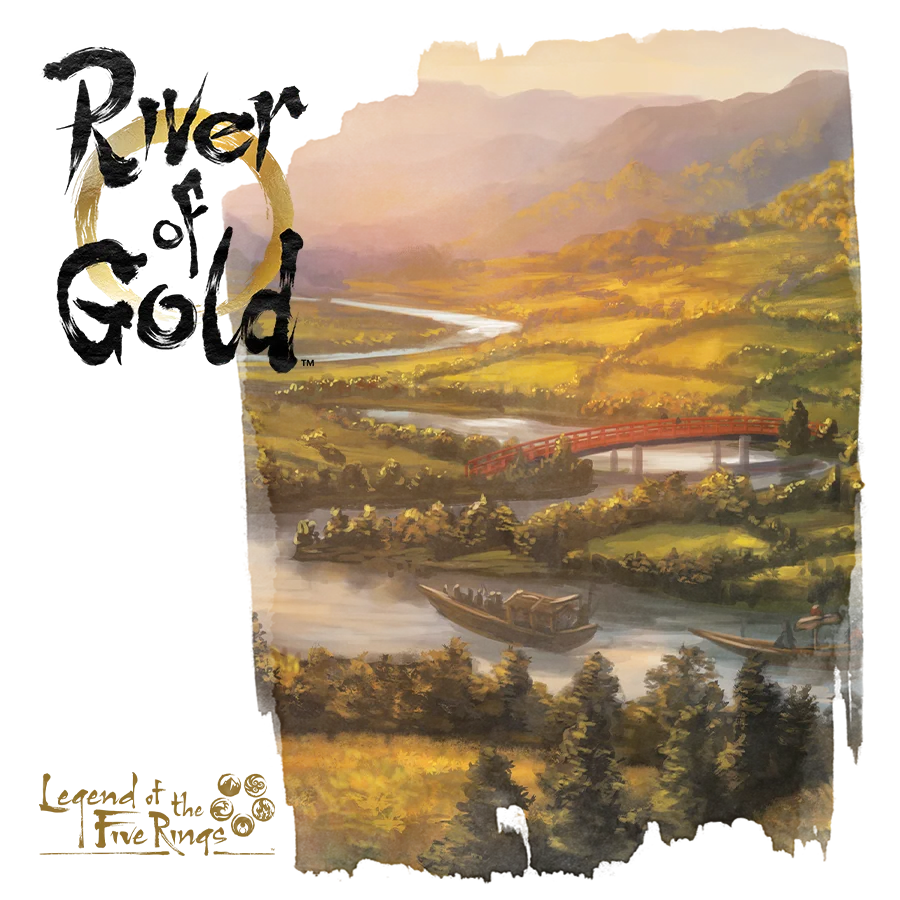The Beauty of the Bargain
In the darkness of the Burning Sands, Ide Uyan seeks out a powerful spirit that could lead her to ancient stories lost to time from the bones of old Rempet.
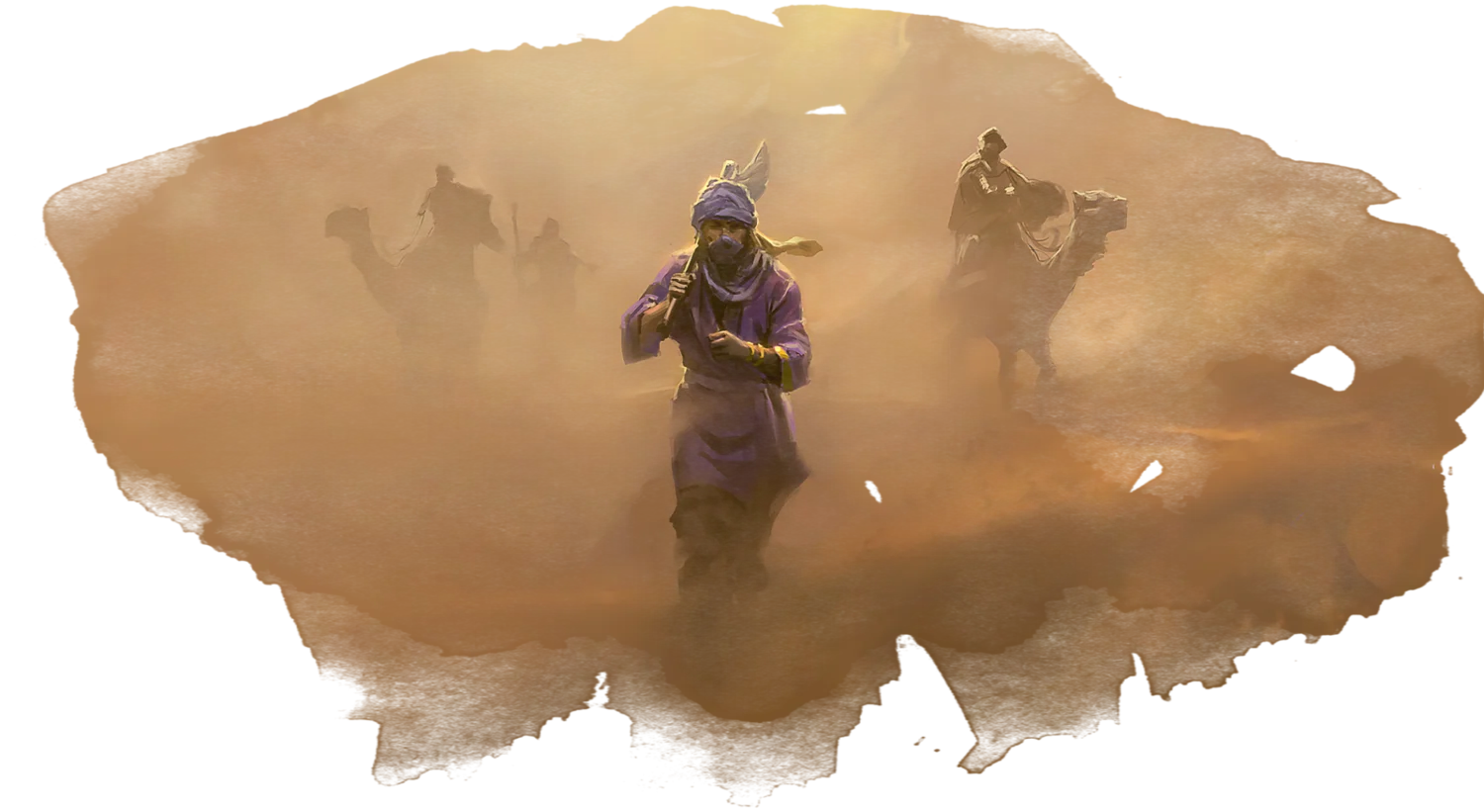
With Children of the Five Winds coming next month from EDGE Studio for the Legend of the Five Rings roleplaying game, we bring you the first of a new and exclusive series of Tales of the Unicorn Clan from Aconyte Books.
In the darkness of the Burning Sands, Ide Uyan seeks out a powerful spirit that could lead her to ancient stories lost to time from the bones of old Rempet.
Read or listen below, and sign up to the Legend of the Five Rings newsletter and subscribe to the Aconyte Fiction Podcast to make sure you catch the rest of the series.
The Beauty of the Bargain
A Tale of the Unicorn Clan
by Josh Reynolds
As with all art, the beauty of the bargain is in the beholder’s eye.
Ide Rin,
Stories of the Sunlight Bazaar
A sharp, sudden yowling split the night.
Ide Uyan, in the middle of telling her companion the tale of the frog and the willow boat, faltered and fell silent. “Mazera,” she began haltingly.
“I hear them, little Ide. Just jackals.” The Ujik guide pulled her sword into her lap, but did not draw it from its horsehide sheath. Like Uyan, Mazera was dressed for travel across the Burning Sands, in loose, dark robes of silk, but there the similarities ended.
Mazera was tall where Uyan was short, and her only expression seemed to be a scowl. Uyan, in contrast, smiled altogether too often, in the opinion of some. These same people often said that she was too clever by half or thought of herself as such. But even a clever woman could have doubts. “Are you certain?” Uyan asked.
“One can never be certain,” Mazera said, unapologetically.
“That does not exactly instill me with confidence.”
“You are not paying me to make you feel confident,” Mazera said.
“At double your normal rate, I expect some sort of assurance,” Uyan said, recalling the hours of negotiation it had taken to agree upon even that exorbitant fee. The ethos of the Ide family was built on the art of negotiation. Uyan was a skilled practitioner; one had to be, in the book trade. But for Mazera’s people, negotiation was less an art than a philosophy. Haggling over even the most innocuous wordage in a contract was a point of pride.
Mazera chuckled. “Do not worry, little Ide. I will protect you, if it comes to it. I am pledged to do so, and so I must.” The Daur took such oaths seriously, even for the Ujik. They were renowned as cartographers and explorers, and it was said that there was not an inch of the desert that they did not know or could not find their way through. It was common knowledge along the Sand Road that if one desired to visit the secret places of the wastes, one needed a Daur for a guide, for it was rare that such expeditions were lost.
“I don’t need protection,” Uyan said.
“You don’t even carry a weapon.”
“I have a knife,” Uyan protested.
“For eating.”
“It’s very sharp,” Uyan insisted.
Mazera shook her head in disgust. “Of course, steel will be of little help here, more is the pity.” She poked at the fire with a stick. “We can still turn back. Surely a mere book is not worth all this.”
“One? No. But many? Now it is debatable.” Uyan pulled her satchel into her lap. It was stuffed with volumes of history, poetry – even a few pillow books, recommended to her by her cousin Konomi. For an Iuchi, Konomi had odd tastes in reading material. Still, variety was the spice of life. A Crane Clan saying, that one, but accurate, nonetheless.
“I still do not understand. Who cares about scratches on paper?”
Uyan frowned. “Well, this supposed djinni of yours, for one.”
Mazera sucked on her teeth. One of her many annoying habits. “Not mine. The djinn belong to themselves. And you should not imply otherwise. They take offense easily.”
“I shall keep that in mind.” Uyan shivered as the wind kicked up. Despite their name, the Burning Sands could become frigid at night. Nearby, their horses whickered unhappily, likely scenting the jackals. Or maybe something else.
The desert was full of strange things. All the stories said so. Djinn, ghosts, and oni were the least of them. Once, in a bazaar in Al-Zawari, Uyan had found the claw of a manticore, or so its seller had insisted. There was no telling what was wandering around out here, looking to make a meal of unfortunate travelers. The thought was as exciting to her as it was frightening. Such were the things great tales were made of.
“Go on with your story, little Ide,” Mazera said, interrupting her reverie. “I was just becoming interested. How did the frog get in the boat?”
“Should we, perhaps, throw some more fuel on the fire first?” Uyan asked. “I’ve read that jackals are afraid of fire.” She’d seen jackals before, of course, but only ever at a distance. They hadn’t seemed so dangerous then.
“Some are,” Mazera said as she stoked the fire. Her dark eyes were fixed on the shadows beyond the light’s edge. Searching, always searching, like a falcon hunting its next meal. Uyan thought it not for nothing that the Daur were known as “those who seek.” That anything at all was known about the Burning Sands was mostly down to their efforts, and Mazera was no exception. “But as I said, I will protect you. Now. The story.”
Uyan cleared her throat. But before she could begin her tale anew, the jackals started up again with their wailing song. To distract herself while she waited for them to fall silent, she looked at the high dunes and rocks that surrounded them. A broken statue, larger than any shrine, loomed over them, its mass providing some shelter from the wind as its shattered features gazed at the black horizon. One of the gods of old Rempet, no doubt.
Her hand fell to her satchel, sitting at her side. It contained a number of books, a few of which were about Rempet. Of these, most were travelogues written by others who’d passed through this region. The rest were dubious compilations of myth and legend. Stories filtered through generations of Qamarist teachings or Rokugani academia.
She wanted to learn the real stories of Rempet; of their animal-headed gods, and more. But such knowledge was vanishingly rare these days. The Qamarists had all but erased Rempet from the world, blotting out even the most innocuous parts of its history. All that remained were stories such as those she had gathered.
“Here is the kingdom of jackals,” Uyan murmured as she retrieved an oatcake from her satchel and thought of all the stories yet to be found. Mazera frowned.
“What was that?”
“Just something my grandfather used to say. Here is the kingdom of jackals, and the empire of vultures; the bones of old Rempet, that perfidious empire that sought to enslave the Ki-Rin and paid the ultimate price for such hubris.” Uyan gesticulated with her oatcake as she spoke. “Or so the stories say. Much road between hither and yon, as the saying goes.”
“No saying I have ever heard,” Mazera said.
“It might be a Qamarist saying. Or Sogdan. A wordy folk, the Sogdan. Lots of proverbs, mostly about what not to eat and when.” Uyan tugged on her earlobe self-consciously. She had always been an accumulator of stories, even from a young age. In her view, the world was composed of them, and every person a collection. She made friends easily, eager to hear even the dullest anecdote and add it to her growing assemblage of tales. Stories, she believed, were how people made sense of the world, even if they didn’t know it.
She had journeyed up and down the Sand Road, from Khanbulak to Al-Zawira, talking to Ujik storytellers, Qamarist scholars and Sogdan philosophers, collecting whatever stories they were willing to share. These, she often compiled for the enjoyment of friends and family, and sometimes others as well. There were many scholars in Rokugan who would pay well for such things, even if only in trade.
Uyan had always had a talent for talking to fellow collectors. It took tact and delicacy to part a scholar from her treatise or a storyteller from his fables. Trade was the lifeblood of the collector. This book for that; this snippet for that excerpt; the location of this volume for a hint as to the existence of that one. You just had to figure out what they wanted, and whether you could give it to them, without too much trouble.
“Does she truly have such a vast collection of stories, this djinni?” she asked.
Mazera shrugged. “So it is said. I would not know myself.” She gave Uyan a hard look. “This is because I know better than to deal with djinn.”
“Anyone who loves stories can’t be that bad,” Uyan said.
Mazera snorted. “You have never met a djinni.”
“But I have read about them.” The Unicorn Clan knew djinn as powerful spirits. The Qamarists, on the other hand, believed that the djinn were merely another sort of person – not human, but a person all the same. They could be good or bad, helpful or malicious. By knowing their true name, one could supposedly bind them, as the sorcerer-kings of Rempet were said to have done. And, of course, the Daur were said to know all about them.
Mazera shook her head. “A book? Pfaugh. Books are written by men. The djinn are not men and cannot be understood as men understand things. To even try is foolish. And to attempt to bargain with one is even more foolish still. Especially this one.”
“Is she a great negotiator, then, this Queen of Jackals?” That was what the Ujik called her, and there were brief mentions of her in the works of Ide Rin and others. All the stories agreed that she was a hoarder of knowledge – knowledge that she wasn’t often inclined to share. Uyan hoped to convince her otherwise.
“Djinn are cunning. They bend the world to suit them. This one – she has a reputation.” Mazera glanced around. If Uyan hadn’t known better, she’d have sworn the other woman was nervous. “They say she takes people sometimes. If they displease her. Or interest her. They say she collects storytellers as well as stories.”
Uyan swallowed, hoping Mazera was exaggerating for effect. “Where does she take them?”
“Somewhere else.” Mazera paused. “Which is why I would like you to finish your story, little Ide. I would hear the end of it before you are whisked away to whatever dull netherhell waits for book-obsessed madwomen. Now, no more distractions. Frog, willow boat. Continue.”
Uyan sighed and did as her guide bade. She had reached the part where the frog rode the willow boat into the underworld when Mazera suddenly gestured for her to be silent. Uyan froze. “What is it?” she hissed.
“Nothing to worry about,” Mazera murmured. “But when I say run, make for the horses.” She drew her weapon slowly from its sheath. The blade was a thin, curved thing, more reminiscent of a cat’s claw than the swords Uyan was familiar with. The wind shifted, carrying a foul odor with it. Not animal musk, but the stink of rotten meat. Uyan gagged and pressed her sleeve to her mouth and nose as the horses whinnied and pulled at their traces.
Mazera reached down and drew a brand from the fire. She swung it slowly over her head, building speed, and then hurled it out into the darkness. The brand popped as it landed, scattering up a spray of sparks.
In the brief flash of light, Uyan saw the jackals. Only they hadn’t been jackals for quite some time. They were dead things; rotting on the bone. The only life in them was the sickly yellow gleam of their eyes and the malignant hunger that burned there. For a moment, the tableau held. Then, with an ear-splitting screech, the jackals surged toward their prey.
“Get to the horses – go!” Mazera cried as she lunged to meet the creatures, her sword licking out in a silvery arc. Uyan didn’t argue. She snatched up her satchel and headed for the animals. The horses were rearing and screaming, lashing out at the darkness with their hooves. A sea of gleaming yellow eyes glared at them, but thankfully the beasts were keeping their distance. Maybe they weren’t interested in horse flesh.
She risked a glance back and saw Mazera whirling amid a frenzy of jackals. The things were tattered scarecrows, desiccated and bony. It was as if something had drained all the life from them before leaving them to be pecked by birds. But raggedy as they were, they still had teeth – and hunger. Worse, death had rendered them all but immune to steel. Mazera’s blows laid them open or removed limbs whole, but the beasts kept coming.
Despite her fear, Uyan could not help but watch in sickened fascination. She had read of such things in certain old works. The sorcerer-kings of Rempet had supposedly been able to drag the dead from their graves and set them to a task. She had thought that sort of magic had passed out of the world with them, but here it was, in all its awful glory. Was this simply something left over from that time, or…?
“Mount up, fool of a woman!” Mazera shouted, interrupting Uyan’s train of thought. “Or do you wish to be eaten?” Mazera beheaded a jackal and leaped over the fire, her robes swirling about her like billows of black smoke. The jackals pursued, some of them hurtling through the campfire in their haste, dragging sparks behind them like tails.
Uyan hauled herself into the saddle of her horse with less grace than she’d have liked. While horsemanship was second nature to an Ide woman, Uyan had never been able to shake the awkwardness of her youth. Scandalously, she’d always felt more comfortable walking than trusting in the disposition of an animal.
Thankfully, her steed was of a docile temperament, but as she discovered a moment later, even docility had its limits. A jackal streaked out of the darkness and snapped at her mount’s legs, causing the horse to rear up in panic. A flailing hoof sent the dead thing rolling away in a broken tangle, but the damage had been done. Uyan’s horse shot away across the dunes, and it was all Uyan could do to stay in her saddle. She held on for dear life, hunching low as she’d been taught. The closer to the horse you were, the harder it was to be thrown.
She could hear Mazera shouting behind her, but Uyan made no attempt to stop the horse. As far as she was concerned, the animal had the right idea. There was a saying among the Ide: let the horse have its way. She risked a glance back and saw Mazera atop her own steed galloping in her wake. Unfortunately, so were the jackals. They swept across the dunes in a black tide, shrieking like devils.
“Ride,” Mazera cried behind her. “Ride!” She thumped her pony’s barrel chest, and the hardy little animal put on a burst of impressive speed, passing her own mount a moment later. A period of frantic momentum followed, and Uyan found her world shrinking to the back of her steed’s head, the rhythmic thudding of hooves, and the moon-painted sands stretching out before them. Were it not for their pursuers, she might even have found it soothing.
Then, all at once, she realized that she could no longer hear them. The din of their cries had faded. All she could hear now was the sound of her own heartbeat and the snorting of her horse. She looked back and saw nothing. Not a whisker of their pursuers was visible in the moonlight. It was as if they’d vanished. She slowed her horse and glanced over at Mazera. “Where did they go?” she called out.
Mazera didn’t reply. Uyan followed her gaze and saw an oddly familiar sight ahead of them: A flickering light in the dark, beneath a looming statue. She felt a flicker of unease. What was going on here? “Is – is that our campfire? Did we ride in a circle?”
“No,” Mazera said softly. She looked at Uyan. “We should leave. Quickly.” But even as she made to turn her horse away from the flickering light, the wind kicked up. It rose and cast up a great cloud of sand that stung their flesh and panicked their horses. Uyan held on to her saddle and tried to turn her horse out of the path of the wind, but to no avail. She heard Mazera shout something but couldn’t make it out.
The wind was howling now, and she could hear voices within it. It was as if many people were talking all at once, in a variety of languages and dialects. Part of her wanted to concentrate on the clamor, to try and isolate and identify what was being said, but something told her that might well go poorly for her. Instead, she bent her head and urged her frightened steed toward the light. Mazera followed, her expression one of reluctance.
As they reached the campfire, the voices grew fainter and the wind fell. She saw a curious figure seated beside the fire. It resembled a woman, albeit taller than any woman Uyan had ever met. Her arms and legs were bare, and an unsettlingly raw red hue. She wore the tattered remnant of a robe and a jackal skull obscured her face. A shaggy mane of white hair spilled down from her head and across her shoulders.
“Oh my,” Uyan said. She felt a flash of excitement and all but tumbled from her saddle in her haste to dismount. “Is it – is that her?”
Mazera reined in her pony and stared up at the strange figure. “It is,” she said glumly. “I am never going to get to hear the end of that story now.”
“Hello, little sparks,” the newcomer said. She stirred the fire – with her fingers, Uyan noticed – raising a spray of embers. “You are looking for me, I think.”
“You are the Queen of Jackals,” Uyan said.
“Is that not obvious?”
“I don’t like to make assumptions,” Uyan said. The djinni laughed throatily and gestured for them to sit. Mazera did so with alacrity. Uyan, more hesitantly. Was this truly a djinni? More importantly, was it the djinni she wished to meet?
“Why are you searching for me, little spark?”
Uyan tensed. That answered that. “I – I wish to bargain with you.”
The djinni paused and the sparks of her eyes grew brighter. “Do you now?” she purred. “And what do you want?”
Uyan hesitated. Mazera gave a slight shake of her head, but Uyan ignored her. “The Daur say you collect stories. Is that true?”
“Yes.” The djinni reached into the fire and scooped out a handful of embers. She rolled them about in her wide palm, like a child playing with stones.
“What about the tales of Rempet?”
Again, the djinni paused. “You are a daughter of Ide, little spark. Surely you know some of them already.”
“I do, but I would know more.”
The djinni slapped her knees and gave a low, growling laugh. “There speaks a hunger I recognize. I too suffer it. I can assuage it. Here you are.” She gestured and suddenly, there on the sand beside her, was a stack of brittle scrolls wrapped in dried skins and palm fronds.
The sight of them was enough to take Uyan’s breath away. “Beautiful,” she murmured. She reached for one, but Mazera slapped her hand away before she could grab it.
“Don’t,” the guide hissed.
Uyan cradled her stinging hand. “I was just looking,” she protested.
The djinni laughed again. “These can, of course, be yours. For the correct price.” She laid her big hand on the scrolls. “Now, what do you have to offer me?”
Uyan glanced at Mazera and then said, “Like for like: stories for stories.”
“Ah, but I have heard so many over the long trail of my life.” Again, the djinni stirred the fire, and Uyan saw that there were faces there – men and women, all speaking though she could not hear their words. She recalled what she’d heard in the wind and felt a sudden chill.
“I have heard the tales of Sogdan and Qamarist fables from the mouths of wandering imams,” the djinni continued, still playing with the fire. “I have even heard the poetry of the Iuchi and the Ide, composed in their exile. Can you offer me something new?”
As she spoke, Uyan spied the prowling shapes of jackals on the dunes above. So they had not disappeared after all. Was this all a trick, then? Was the djinni merely playing with them? Or was it more akin to a show of force? As negotiating tactics went, it was not unheard of. The bared blade lent a certain weight to the lightest of arguments.
“That depends,” Uyan said carefully. “What are you interested in?”
The djinni leaned forward, so that the flames surged up to either side of her head and curled about her shoulders. “Something new, as I said. Do you have something new for me?” There was an implied “or else” there. Uyan licked her lips. What would the djinni consider new? She decided to name an old favorite.
“Frog and the willow boat?”
“I’ve heard it.”
“The three lovers and the lion’s wager?”
The djinni clucked her tongue chidingly. “An old one.”
Uyan hesitated. “The man of clay?” she asked, naming one of her favorite Sogdan stories. “Or what about the djinni and the philosopher?”
A jackal snarled. Yellow eyes gleamed in the firelight. The djinni sighed. “Old and older,” she murmured. Then, more fiercely, “You are wasting my time.” She fixed Uyan with a too-bright gaze. “You are not the first to attempt to bargain with me, you know. Storytellers, scholars and wisemen have come in search of me, seeking my stories – my stories. Seeking to take what I have collected for their very own. How dare they? How dare you?”
The djinni stretched and stretched and kept stretching, as if she were a piece of red string spooling upward and outward, until her crouching form filled the immediate horizon. The jackals yelped and howled as their queen stretched across the night. Mazera hissed in alarm and went for her sword, but Uyan caught her wrist and shook her head. Steel was useless here. Only negotiation could save them. Curiously, she felt no fear – only anticipation. Negotiation was what the Ide did. Even so, the thought that she might have made a mistake stirred at the base of her mind.
The Queen of Jackals bent down to examine Uyan and Mazera, crouching over them like some great lion of the veldt, her eyes torches within the hollow sockets of the jackal skull. She stank of cinders and burnt cinnamon. Uyan’s kernel of doubt began to grow. Maybe she should have listened to Mazera after all.
“You come and ask for my treasures and offer nothing of value in return,” the djinni continued. “An insult.” As her words throbbed on the air, the jackals began to close in. Their horses screamed and bolted as the wind rose anew.
As the animals galloped away, Mazera grabbed Uyan and pushed the other woman behind her. “She meant no insult, oh queen. Let us make recompense and remain friends.”
The djinni paused. “I bear you no malice, daughter of my cousins. You may leave, if you wish, unmolested. But do not stand against me, else it will go badly for you.”
Mazera hesitated. She glanced at Uyan, and then snatched her sword from its sheath and made a wild lunge for the djinni. “Run, little Ide!” she shouted.
Uyan stumbled back as the jackals converged on Mazera, attacking from all directions. She struck down two before the djinni swatted her to the ground the way a parent might smack a recalcitrant child. Her great red hand pinned Mazera to the sands as the jackals seized her wrists and shook her sword from her grip. Mazera cried out in pain as the rest of the jackals crept toward her.
Uyan hesitated. She could run, now, as Mazera had told her, while the djinni and her pets were distracted. She might even make it. But that was not the Ide way. Instead, she took a breath and yelled, “Wait!”
The jackals paused. The djinni looked at her. Uyan swallowed and pulled her satchel close. “Mazera was right. It wasn’t an insult,” she said quickly. “A misunderstanding! I – I misjudged the depth of your knowledge. I am told it is a failing of mine.” She paused, and then decided to let the horse have its way. “I still wish to bargain. It is why I came, after all!”
The djinni shrank down between one eyeblink and the next and stepped over Mazera to saunter toward Uyan. “And why should I bargain with you?”
“I – I can provide you stories. New ones.”
The djinni coiled about Uyan like smoke, one long finger caressing her cheek. “Oh, you will. I can hear the hum of your stories in your blood, and I will peel them loose, one by one, little spark, until your voice joins the rest in the wind.”
Uyan squeezed her eyes shut. “That’s not very practical, is it?”
The djinni paused. “What do you mean?”
“If you do that, you will only have the stories I know now. What about the ones I might yet learn in the future?”
The djinni took a firm grip of Uyan’s chin and turned the woman’s head to face her. “Is this a riddle of some sort?” the djinni growled. “If so, it is poorly conceived.”
“Not a riddle,” Uyan said. “A question. You are immortal, yes? Why sacrifice long term satisfaction for short term gain?”
The djinni’s grip tightened. “Explain yourself.”
Uyan took a deep breath. “There are more stories in the world than storytellers. You cannot know them all, especially if you dam the river, so to speak. Those scrolls… how many like them do you have?”
The djinni hesitated. “What?”
“What about books?” Uyan was speaking swiftly now, her mind whirring down avenues of desperation. The djinni had only referred to stories – not books. Obviously, she could read, else why keep the scrolls? But what if…? It was a gamble, but sometimes one had to make a wager to win the game.
“Books?” the djinni asked. “Is that some form of scroll?”
Uyan’s eyes snapped open. There it was. The avenue of escape. “Yes. But they contain more than any scroll can manage.” She held up her satchel. “Why, I have several in here that contain stories you are likely unfamiliar with. And I can get more!”
“More?”
“Yes! That’s my profession, you see. I am a collector, like yourself. I collect and compile and – and trade.” As the djinni’s grip slackened, Uyan took a chance and stepped away. She turned to face the djinni. “Why take what might be freely given? Why hoard, when you could trade?”
The djinni stared as if such a thing had never occurred to her. Uyan pressed on. “I could get you, well, hundreds of books, if you like. How about this one: a collection of anecdotes from the Carpenter Wall.” She pulled out a slim volume and proffered it even as she extracted another. “Or this one: an account of Ide Chiyo’s journeys along the Sand Road. Are you familiar with Chiyo? No? Oh, you must read it!”
The djinni accepted the books hesitantly. She looked at them, and then at Uyan. “You will… give these to me?”
“Oh yes – in trade,” Uyan said as she continued to rummage in her satchel.
“Trade?”
“For the scrolls.” Uyan kept up the flow of words, bowling over any response from either the djinni or Mazera. In negotiations it was always best to ensure you controlled the flow of conversation, however that was best achieved. “I can’t read them all at once, obviously. And when I’m finished, I’ll return these and borrow a few more. In return, you can enjoy these books until I return, and I’ll bring you a few more. I’m in the midst of compiling a volume of Qamarist anecdotes that you might find entertaining, actually. Do you read Sogdan? Oh wait, of course you do. Never mind. I have a wonderful book of poetry you simply must try, I think it’s – ah. Here we are.” Another volume, in a cover of goatskin, sailed into the djinni’s hands.
“And if I know the tales in these?” the djinni asked slowly.
“Then I can find more. I could come yearly, if you like. Bring new books and stories as I find them. I do much the same for several nobles of my acquaintance. I could simply add you to the list, as it were. If you found that an acceptable bargain, I mean.”
The djinni studied her for long moments. Then she gestured sharply. The jackals released Mazera and slunk away, vanishing into the night as if they had never been there at all. “Yes. That is acceptable,” she said. She looked down at the books she held and then motioned to the scrolls. “A year to the day, then. You shall return with my scrolls and bring me more books in trade.”
“And you will bring more scrolls?” Uyan asked.
“To borrow?”
“To borrow,” Uyan assured her.
The djinni nodded. “Then we have a bargain.”
Uyan smiled widely and held her hand out. “Excellent!” The djinni looked at her hand, and then at her, before gently clasping Uyan’s hand in her own. Her grip was warm, almost too much so, but she released Uyan’s hand before it became uncomfortable. An instant later, she too was gone, leaving behind only the faint scent of cinnamon.
Uyan sagged in relief. “Oh my. That was more exciting than I expected.” She looked over at Mazera. “Are you all right? That was very brave and much appreciated. Though I did have it in hand.”
Mazera sat up and glared at her. “Did you now? You know that you’ve bound yourself to a djinni, yes? You understand that you will have to bring her new stories every year from now on, or else? Not a position I’d like to be in.” She rose and dusted sand from her robes. “Was that bit with the books cleverness or luck?”
“Every good negotiation is a bit of both,” Uyan said as she reverentially placed the scrolls in her satchel. Her fingers itched to unroll them, to read them. But that was for later. There was a lord in Khanbulak who would pay well to read a translated version once she’d finished with them. “As Ide Rin wrote, ‘the beauty of a bargain is in the eye of the beholder.’” She grinned at the other woman, trying her best to mask the unease she felt. Every bargain was a puzzle box, its secrets often not understood until too late. Only time would tell whether this one would mean her end. Then, the same could be said of the others she’d made. In any event, a problem for the future. For now, she had what she wanted and that was enough. “It makes for a fine story either way, I expect,” she said, after a moment.
Mazera retrieved her sword and sheathed it. She peered up at the stars overhead and then at their guttering campfire. “Speaking of which, I want to hear the rest of your story of the frog and the willow boat. No more distractions.” She crouched before the fire and began to stoke it.
Uyan smiled. “I suppose we have some time. Very well.” She sat, cradling her satchel on her lap, as the fire roared up anew. She frowned as a thought occurred to her. “Do you think the horses will come back?”
“Mine will,” Mazera said. “Now tell me about the frog, if you please.”
Uyan laughed. “Where was I? Oh yes, I remember.”
As she spoke, a jackal howled somewhere out among the dunes.
But this time, neither woman paid it any mind.
